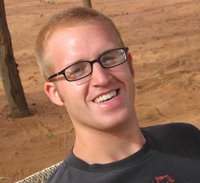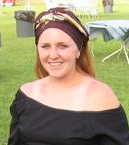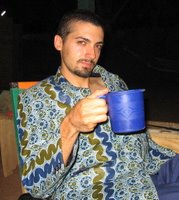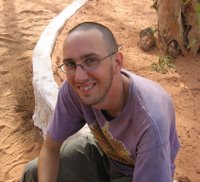Thursday, September 07, 2006
Wednesday, September 06, 2006
Components of the Best Care Package Ever
~ Cheese. Velveeta, Cougar cheese, those cheeses that people send their relatives for Christmas. We have locally made cheese here… but it puts me at risk for tuberculosis.
~ Pictures! Pictures of you, your pets, your garden, your surroundings. It’s a little piece of America for me, plus, villagers love looking at them and always have questions about the US.
~ CD’s: if you send me blank ones I’ll send you pictures!
~ Stationary; (while we’re on the subject of what I can send you)
~ Shampoo. It’s sold here, but it doesn’t suds up and it seems like the angrier I get at the lack of suds, the waterier the shampoo becomes.
~ Trashy magazines. Yeah I know. You’re above it and will probably even be embarrassed buying them, but you’re not here and we are, and here, none of us are exempt from the pull of US Weekly, People, In Touch, and In Style.
~ Ice Cream. No, just kidding
~ Dried Fruits and Vegetables. I like them all. And I'm desperate. Sometimes I eat leaves.
~ Maple Syrup. I can make pancakes, and French toast, but when I’m done they just look up at me, all golden brown and barren and I can tell that they’re wondering where the syrup is.
~ Taco Bell mild sauce, or any fast food sauce packets. Generally, the bigger and more evil the corporation, the longer their shelf life.
~ Coffee, whole bean -I have a grinder here. Think of it as me saving African babies one milligram of caffeine at a time.
~ Anything chocolate.
I'll go ahead and bold this part:
Natalie Beck
Corps de la Paix
B.P. 89
Konni, Niger
West Africa
The Woman in the Well
She was conscious. Everyone migrated to her house. Her family put her in her best clothes and onto the back of a motorcycle to ride the 5k through sand and mud to the dispensaire where later I found out she had refused to have a full exam because the doctor is male. Women here feel "shame"; that's the closest translation into English, but really it encompasses so much more than what might be conjured up by an American mind. It involves etiquette, morals, and lifestyle choices all silently dictated through tradition.
She is the fourth person to fall into this well. In a village, not too far from mine, I heard that a person fell into a 17 meter deep well and died. Here is the good news: Hadiza had a baby boy last week. I went to the baby naming ceremony. He seems healthy. Also, I'm convinced that getting funding to improve this well is the right thing to do. I would feel shame if I didn't.
Friday, June 23, 2006
Projects (continued)
Thursday, June 22, 2006
Projects
So towards the end of November, while most of you are working on your second helping of sweet potato casserole (and I say that with the utmost envy), I'll be lubing up my green Trek preparing for the annual AIDS awareness bike ride. We will cover just under 200 kilometers in the week, ending on December 1st, World AIDS Day. The mission of the Bike Ride is to inform Nigerien men, women, and youth about AIDS transmission and prevention, to stress the importance of testing and treatment through the testimony of HIV-positive Nigeriens, and to attract attention to the hard work being done by countless Nigeriens and members of the international community in the fight against HIV/AIDS in Niger. And you don't even have to let go of those holiday pounds in order to contribute to the cause, just send your donations of bike parts, energy foods, etc. to:
Corps de la Paix - Attn: Natalie Beck and Becky Hartz - BP 10537 - Niamey, Niger - West Africa
Thursday, June 15, 2006
You might be in a bush taxi if...
Friday, March 17, 2006
Becoming Official
Yahoo! Mail
Use Photomail to share photos without annoying attachments.
Thursday, March 16, 2006
More Pictures

Cathy, Alex, and I with the mango tree that we planted. We are officially tree planters.
 The saddles used on every single camel in this country cannot even be called phallic because the handles don't look like penises, they're exact replicas. See for yourself.
The saddles used on every single camel in this country cannot even be called phallic because the handles don't look like penises, they're exact replicas. See for yourself.



















